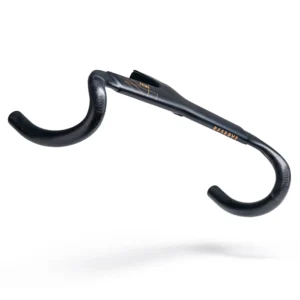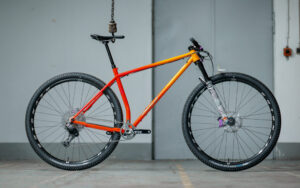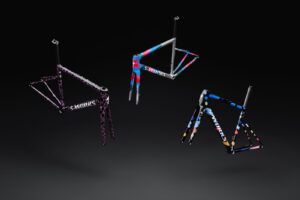For a few years now, I have been cycling races regularly. From the peloton, you regularly hear whining and complaining about the starting cyclists. They 'can't steer', 'don't follow the rules', 'don't understand the game' and other remarks that are thrown at you when you go to your first (training) race. Hence, it is a good idea to go to your first race prepared by taking in the tips below:
1. How to steer
Experienced riders always whine about young and new riders in the peloton because they cannot steer and cause unnecessarily dangerous situations. This is not always the case, but most of the new riders have to get used to the speed, quickly ride beyond their capabilities and sometimes make steering errors or touch the ground with their pedals. This scares the hell out of riders who have been around longer, because everyone has been there before and is terrified of a crash. Nobody likes the sticky sheets on their thighs, the too-small plasters and visits to doctors and physiotherapists.
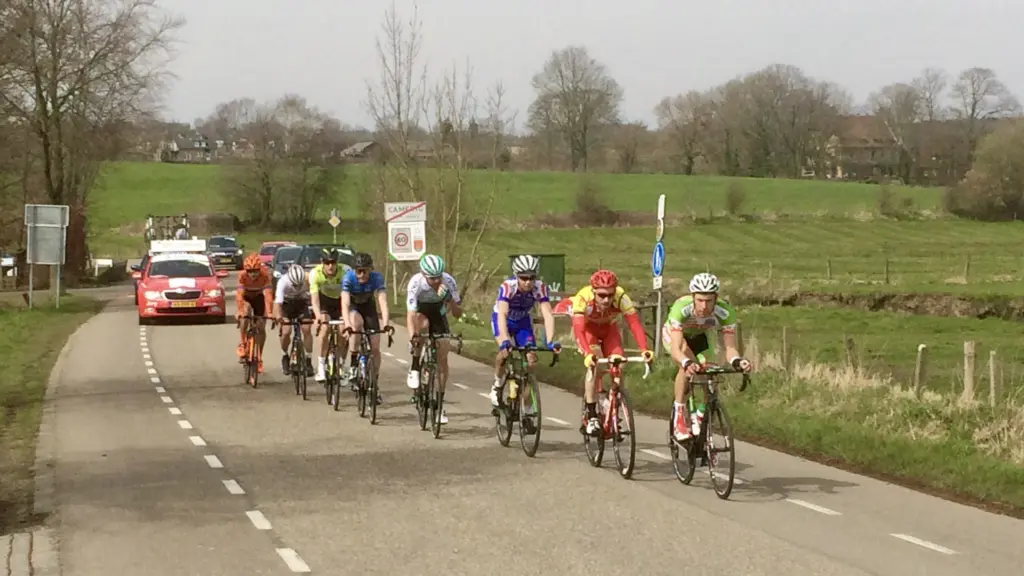
Don't let this discourage you, because you have to start somewhere, but be prepared for the fact that a peloton is full of anxious people who nevertheless seek danger. An accident is in a small corner and as an inexperienced peloton rider, you just have to pay twice as much attention. Therefore, always ride the course in advance and estimate the turns. Take the tricky corners at least once at full speed to assess how to cut it. Preparation is half the battle and this is where you will need to invest a lot of time as a beginner.
2. Drinking enough
During a race, you quickly cycle at an average of around 40 kilometres per hour. That is quite an effort and this causes you to sweat a lot in a short time. So drink enough water before the start of the race and make sure you have one full water bottle during the race.
3. Make sure you are well trained
Anyway, never come to your first race untrained. The first condition for joining a race is that you can ride hard, which, by the way, does not necessarily mean that you are a good rider. So make sure you meet at least that one condition, because that is something you can influence yourself beforehand.
4. Get everything off your bike
But then really everything. In a race, you can only leave your bottle cages on. You remove your saddlebag, mudguard, lights and other frills beforehand. This is mainly for safety reasons and if it is seen during the race, the jury will immediately take it off course.
5. Expect to be scolded
There is a lot of swearing in a peloton. This varies from frustrated riders to abusive canonnades against the elements. As a newcomer to the peloton, it can come across as rather intimidating when the person in your will yells at you to 'close the damn gap or I'll ride you into the shoulder'. Of course you ride that gap closed, but you don't always have to. Maybe the best man (or woman) should be allowed to take a hands-off approach himself.
6. You do not ride out the race
Assume one thing. You don't ride out your first race (at least not in the peloton) and if you do then you are riding a level too low. If you want to get as far as possible anticipate the pattern that follows every race:
-The first few rounds/kilometres go cracking
-Then it falls silent for a while and there are demarrages
-The last few rounds are going again cracking
7. Wear a helmet!
This goes without saying. In a race it is compulsory, but somehow there are always idiots who forget their helmet or think it is not necessary. Free tip: choose a somewhat aerodynamic helmet, it will save you another few watts!
8. Make sure you eat enough beforehand
Like drinking, you also need to eat enough. The bike must have enough fuel to perform. In any case, there is one maxim: don't eat within two hours before the start of the race. So a steak and a plate of pasta half an hour before the race is not a good idea! However, a gel with some extra sugars can't hurt.
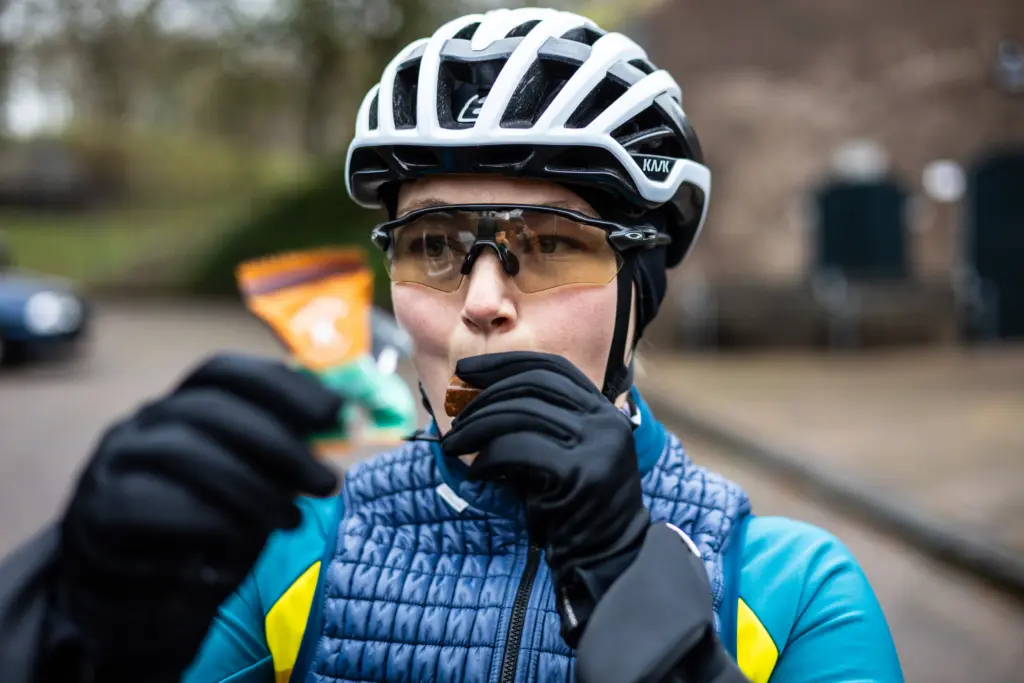
9. Do not make unexpected movements
A peloton moves across the tarmac like a snake, if you as a loner step out of that pattern you are guaranteed to cause a crash. So look carefully in front of you to see the patterns in the peloton. Keep the wheel in front of you and if you encounter a pit or other obstacle at the last moment, grab your handlebars firmly and catch the blow yourself without endangering others.
10. Provide at least a starting licence
For a few euros a year, you can get a starting licence from the KNWU. You need this at most clubs to be allowed to ride in club and fun class races. So make sure you have it in any case, as you are often not allowed to start without a starting licence for insurance and safety reasons. In addition, it is definitely worth becoming a member of the club where you are often a guest, then you can also order the club outfit straight away and 'belong'.
If you are going to race for real, consult with your club in which category you can start. The class above the fun class hot sports class. Above that are the amateurs and there again above the elite riders.
11. Don't overstay your welcome with your first match
You are never ready for your first race. You only learn to ride a race by doing it. So don't wait until tomorrow but sign up today at your local cycling club!
12. Take money with you
I have been cycling with my club for about 10 years now, and I still regularly cross the finish line exhausted after a club race. So some change for a coke afterwards is never amiss. Moreover, you often have to pay cash at registration, these costs vary per course between 2 and 10 euros. You cannot easily withdraw cash at every club. So cash is often the best option.
13. Be prepared for bad weather
It really can start raining any time in the low countries. So in spring and autumn, don't forget to bring a mackintosh.
14. Bring a dry undershirt for after the race
When cycling home, it is best to put on a dry undershirt so you don't catch a cold on the way back.
15. Shave your legs a day in advance
Leg shaving is part of it, but do it at the right time; a day before the race, that is. This will avoid irritation on the day of the race.
Want to know all about shaving your legs? Read our article on shaving your legs.
16. Don't make unnecessary last-minute adjustments to your bike
This is unnecessary and can only cause you to sit oddly on your bike. It is very tempting to move your saddle 1mm higher or lower so soon before the race. Experience shows that it is better to do this a few days before the race so you can get used to the new settings of your bike.
17. Take spare pins with you
One of the great charms of cycling a race is pinning on your race number. In principle, you always get four pins with your bib number, with which you can attach it properly. It could just be that one pin is broken or that you prefer to attach the number with six pins, for example. So always take a few spare pins with you to avoid any surprises.
18. Drive a test lap (or three)
If you are riding a course for the first time, you should do this anyway. Get a feel for the corners and see where the toughest part is. Also pay close attention to the wind and decide in which position in the peloton you should position yourself to be out of the wind.
19. Start as far in front as possible
The best position in a peloton is at the front of the bunch. Here you are just ahead of the crowds, but full of wind. Especially in the first few kilometres, the race is very fast and you better be at the front, so you can strategically drop a few places in tricky spots. Of course, you have to move up those spots again in a convenient spot.
20. Don't be afraid to ask questions
If a silly question can help you avoid a crash, just ask the question. Cyclists are generally social creatures and will always help answer your question. This way, you'll have some instant contact in the peloton!
21. Stay in the wheel of your predecessor.
Did you brake just a little too much before a corner? Then ride your own gap that you have left, if you feel you don't have the energy to do this anymore just let the peloton run. Most crashes occur because people ride above their power in the peloton and thus react too late.
22. Look for your
The asphalt or your predecessor's derailleur can be a nice aiming point, but please look in front of you. That way you can anticipate turns and movements in the peloton.
23. Don't gossip on others
Counting the number of roggles in a midweek peloton of amateur cyclists is even harder than estimating the number of hairs on your head (unless you are bald). Exercise releases a lot of snot and mucus, which are expertly blown out of the body via the airways (nose or mouth). So there's no problem in taking part in this, but do think about your fellow man and don't place your phlegm on the upper legs of the rider behind you but in the verge or an empty piece of tarmac. This also applies to experienced racers, by the way!
24. Register in advance
Some competitions require you to register in advance through the federation. In the Netherlands, you can register via My KNWU for official races. However, for a first race, I would recommend riding a club race in the lowest class, you can register for this on the spot.

